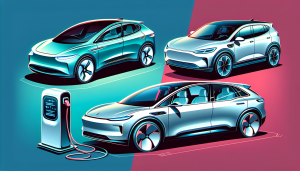Electric cars, also known as "green machines," are gaining popularity as the world shifts towards a more sustainable future. With advancements in technology and growing environmental awareness, electric cars offer numerous benefits over traditional gasoline-powered vehicles. In this article, we will explore the eco-friendly advantages and potential hurdles of electric cars.
The Rise of Electric Cars
In recent years, electric cars have seen a significant increase in demand as more people recognize the importance of reducing greenhouse gas emissions and combating climate change. Major car manufacturers such as Tesla, Nissan, and Chevrolet have been leading the charge in producing electric vehicles that are not only environmentally friendly but also stylish and high-performance.
Benefits of Going Green
One of the most obvious benefits of electric cars is their positive impact on the environment. By running on electricity rather than gasoline, electric cars produce zero tailpipe emissions, which helps improve air quality and reduce pollution. In addition, electric cars are quieter than traditional vehicles, contributing to a more peaceful and less noisy urban environment.
Environmental Impact
The environmental benefits of electric cars go beyond just reducing emissions. Electric cars also have a lower overall carbon footprint compared to gasoline-powered vehicles. This is because the production of electricity, even when generated from fossil fuels, is more efficient and produces fewer emissions than burning gasoline in internal combustion engines.
Lowering Carbon Footprint
Switching to an electric car can significantly lower your carbon footprint, especially if you live in a region where the electricity grid is powered by renewable energy sources like wind or solar. By driving an electric car, you can help reduce your personal contribution to climate change and support the transition to a cleaner and more sustainable energy system.
Energy Efficiency
Electric cars are more energy-efficient than conventional vehicles because electric motors convert a higher percentage of energy from the grid into power for the wheels. This means that electric cars can travel farther on the same amount of energy compared to gasoline-powered cars, making them a more efficient and cost-effective transportation option in the long run.
Government Incentives
Many governments around the world are offering incentives to encourage the adoption of electric cars. These incentives can include tax credits, rebates, and access to carpool lanes. By taking advantage of these incentives, you can save money on the purchase of an electric car and enjoy other perks like reduced registration fees and parking discounts.
Charging Infrastructure
One of the challenges of owning an electric car is the availability of charging infrastructure. While charging stations are becoming more widespread, especially in urban areas, there is still a need for more investment in charging infrastructure to support the growing number of electric vehicles on the road. However, with advancements in technology, fast-charging stations are becoming more common, making it easier and quicker to charge your electric car on the go.
Range Anxiety
Range anxiety, or the fear of running out of battery power before reaching your destination, is a common concern among potential electric car owners. However, as battery technology improves, the range of electric cars is increasing, with some models now able to travel over 300 miles on a single charge. Additionally, the development of a more extensive network of charging stations helps alleviate concerns about range anxiety.
Cost Considerations
While electric cars may have a higher upfront cost compared to traditional vehicles, they can be more cost-effective in the long term. Electric cars have lower maintenance costs because they have fewer moving parts and do not require oil changes or regular tune-ups. Additionally, the cost of electricity is generally lower than gasoline, making it cheaper to fuel an electric car over time.
Maintenance Savings
Another advantage of electric cars is the potential savings on maintenance and repairs. With fewer components that can wear out or break down, electric cars are generally more reliable and have lower maintenance requirements. This can save you money on repairs and reduce the downtime associated with servicing a traditional gasoline-powered vehicle.
Future of Electric Cars
The future of electric cars looks promising as more car manufacturers invest in developing electric vehicles and expanding their electric car offerings. With advancements in battery technology, charging infrastructure, and government support, electric cars are becoming more mainstream and accessible to a wider range of consumers. As the demand for electric cars continues to grow, we can expect to see even more innovative and environmentally friendly options on the market.
In conclusion, electric cars offer a variety of eco-friendly advantages, from reducing emissions and lowering carbon footprints to saving money on fuel and maintenance costs. While there are still challenges to overcome, such as charging infrastructure and range anxiety, the future of electric cars looks bright. By choosing to drive a green machine, you can not only help protect the environment but also enjoy a more sustainable and cost-effective way of getting around. So why not join the electric revolution and make a positive impact on the planet with your very own eco-friendly electric car?
